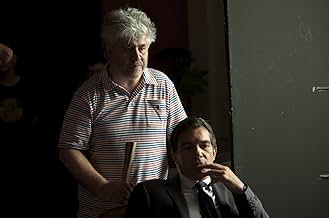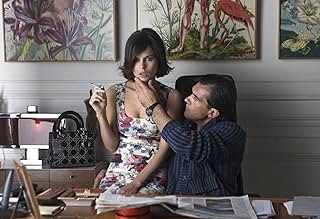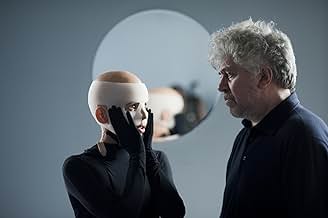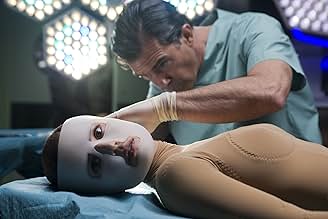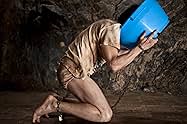Il film racconta la storia di Robert Ledgard, eminente chirurgo plastico in cerca di vendetta nei confronti dell'uomo che ha stuprato la figlia.Il film racconta la storia di Robert Ledgard, eminente chirurgo plastico in cerca di vendetta nei confronti dell'uomo che ha stuprato la figlia.Il film racconta la storia di Robert Ledgard, eminente chirurgo plastico in cerca di vendetta nei confronti dell'uomo che ha stuprato la figlia.
- Ha vinto 1 BAFTA Award
- 28 vittorie e 69 candidature totali
Trama
Lo sapevi?
- QuizAfter a few days of shooting, Pedro Almodóvar had a conversation with Antonio Banderas in which he told Banderas that he needed to drop all of his tics as an actor, because the director wanted a really restrained character and the actor was playing him in a more typical psycho way.
- BlooperWhen Doctor Robert Ledgard and his colleagues are preparing themselves for surgery, they fasten each other's surgical gown from the back, contaminating their sterile gloves.
- Citazioni
Profesora de Yoga en TV: There's a place where you can take refuge. A place inside you, a place to which no one else has access, a place that no one can destroy.
- Curiosità sui creditiAt the start of the end credits, there is a rotating DNA double helix in the background.
- ConnessioniFeatured in At the Movies: Cannes Film Festival 2011 (2011)
- Colonne sonorePor el amor de amar
(Versión Castellana)
Written by Jean Manzon and José Toledo
Performed by / interpretada por CONCHA BUIKA (Buika), al piano Iván González Lewis (as Iván 'Melón' Lewis)
© 1960, by Jean Manzon & Jose Toledo.
Autorizado para todo el mundo a Universal Music Publishing, S.L.
Todos los derechos reservados.
Grabado en CATA (Madrid).
Recensione in evidenza
In his latest film Almodóvar takes a qualitative jump into new philosophical depths. His usual reflections on the nature of relationships and the consequence of one's actions take on a well- defined shape and advance forward with self-assurance.
The order in which the events of the story are told is a cunning device that allows the director to make us reflect on how superficially - indeed, skin-deep - we perceive reality and how quick we are to judge first impressions and jump to conclusions. What we first perceive one way, those initial scenes that slightly baffle us but which we nevertheless do not hesitate to judge in a specific way, take on a completely new meaning when the story pauses to take us back into the past in order to tell us about an important series of events that happened at the time which bear a direct relation to present events. The new light that is shed on the present changes completely our perception of the story as we had first witnessed it, which is a humbling experience. We are then taken back again to the present and continue watching the rest of the film, but with this completely new understanding of the real underlying motivations for the characters' actions. It is at this point that through a slight thriller-style twist in the plot the story takes on a Shakespearean dimension as it delivers its powerful humanist lesson that vengeance begets vengeance.
Food for thought, in fact enough food to last you days and feed other people, as you are left on the one hand wondering at the concept of skin: what we actually desire when we desire someone, whether all desire is skin-deep, whether the skin does not allow us to see the person behind. And on the other hand you are left with the reflection on how the road of vengeance leads only to self-destruction. When a film leaves you pondering so deeply, I can only conclude it is a great film.
The order in which the events of the story are told is a cunning device that allows the director to make us reflect on how superficially - indeed, skin-deep - we perceive reality and how quick we are to judge first impressions and jump to conclusions. What we first perceive one way, those initial scenes that slightly baffle us but which we nevertheless do not hesitate to judge in a specific way, take on a completely new meaning when the story pauses to take us back into the past in order to tell us about an important series of events that happened at the time which bear a direct relation to present events. The new light that is shed on the present changes completely our perception of the story as we had first witnessed it, which is a humbling experience. We are then taken back again to the present and continue watching the rest of the film, but with this completely new understanding of the real underlying motivations for the characters' actions. It is at this point that through a slight thriller-style twist in the plot the story takes on a Shakespearean dimension as it delivers its powerful humanist lesson that vengeance begets vengeance.
Food for thought, in fact enough food to last you days and feed other people, as you are left on the one hand wondering at the concept of skin: what we actually desire when we desire someone, whether all desire is skin-deep, whether the skin does not allow us to see the person behind. And on the other hand you are left with the reflection on how the road of vengeance leads only to self-destruction. When a film leaves you pondering so deeply, I can only conclude it is a great film.
I più visti
Accedi per valutare e creare un elenco di titoli salvati per ottenere consigli personalizzati
Dettagli
- Data di uscita
- Paesi di origine
- Siti ufficiali
- Lingua
- Celebre anche come
- La piel que habito
- Luoghi delle riprese
- Aziende produttrici
- Vedi altri crediti dell’azienda su IMDbPro
Botteghino
- Budget
- 10.002.914 € (previsto)
- Lordo Stati Uniti e Canada
- 3.185.812 USD
- Fine settimana di apertura Stati Uniti e Canada
- 223.119 USD
- 16 ott 2011
- Lordo in tutto il mondo
- 33.716.389 USD
- Tempo di esecuzione2 ore
- Colore
- Mix di suoni
- Proporzioni
- 1.85 : 1
Contribuisci a questa pagina
Suggerisci una modifica o aggiungi i contenuti mancanti


![Guarda Tráiler [OV]](https://m.media-amazon.com/images/M/MV5BODliMDVlYjQtN2U1OC00MGVlLWE5YWEtNDk5OTMzMGZkOGFhXkEyXkFqcGdeQXRodW1ibmFpbC1pbml0aWFsaXplcg@@._V1_QL75_UX500_CR0)





